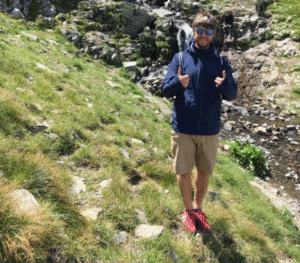After being awarded the ELTABB scholarship fund last spring, Annie Heringer attended her first conference of the European Association for the Teaching of Academic Writing (EATAW) in July 2021. Here, she shares some of her thoughts and impressions.
The topic may sound narrow to an outsider, but if you stop and think about writing for a minute, it’s not hard to understand how it connects to the way we think, communicate, learn, and make sense of ourselves and the world around us. The EATAW conference afforded the opportunity to reflect upon writing in new ways and even engage in some writing ourselves.
Working from Home (in bed, in pyjamas?!)
To give a sense of the scope of topics touched upon at the conference, I’ll start with Bronwyn Williams’ presentation “Basements, bedrooms, and parking lots: The physical and emotional spaces of writing during a pandemic.”
This research is part of an emerging thread of interest into the materialism of writing, which of course has been hugely affected by the coronavirus. Williams’ interviews revealed some surprisingly positive reports from students whose relationship to writing has improved due to the virus forcing them to reckon with the physical requirements needed in order to write.

As someone who spent the summer writing my dissertation in the apartment I share with my family, regularly moving stacks of paper from my desk to the couch, to the bed and back, I could easily relate to the task of forging new space to write in.
The Evolution of the Essay
Another favorite presentation came from Stuart Wrigley on exploring slowness in academic writing. He claimed that the essay, that paragon of academic writing, has shifted from once being a meandering intellectual exploration of ideas to become a tightly-planned piece of writing that must resolve neatly in a conclusion, however prematurely.
The effect has turned the essay into an “information-mining” activity that values contained answers rather than open questions. There was a deep irony in the fact that Wrigley’s presentation was shoehorned into a ten-minute slot, but his suggestion is an important one; who hasn’t felt the pressure to do more in less time in their classes?
Wrigley’s call to reevaluate the fundamental purposes of writing definitely deserves more thought and attention.
AI – Blessing or Curse?
One of the larger themes of the conference was the rise of artificial intelligence (AI) and its implications for academic writing.
A longer themed-discussion led by Ingerid Straume and Chris Anson presented some very scary new technology, including Keenious, which is a software that scans a text and makes suggestions for research. In other words, it gives you the supporting citations and quotations for your ideas so that you don’t have to do the research yourself.
While Keenios is still developing, some very sophisticated AI essay-generators are already out there, such as this one. You can try it yourself for free: just type in the topic of choice and the AI produces a very comprehensible text that is definitely passable as student work. With this type of AI in rapid development, Straume and Anson asked what we as writing teachers can do to avoid becoming ‘plagiarism police’.
Some very wise suggestions resulted from this discussion, including incorporating multimodal elements such as images and audio-visual elements into writing assignments that develop critical thinking skills while being harder for machines to replicate.
Creative Writing, Creative Teaching
Lastly, I want to mention a workshop led by Katrin Girgensohn, the academic director of the writing center at European University Viadrina. Prompted by a new position teaching creative writing, she led a small group of participants in a series of unfolding writing tasks. We ultimately wove these together to create a personal narrative about the work that we do and the conditions created by the coronavirus.
It was an eye-opening experience as no one knew where we were going with the writing until the final step. Seeing our disparate pieces of writing fall together was incredible. It was also a good reminder that sometimes you just have to write blindly and trust your own feelings, in faith that you’ll eventually arrive somewhere. In this case, the final piece was much more than the sum of its parts and an unexpected happy ending.
The Future is Bright!
The 2021 EATAW Conference was hugely inspiring and evidenced the power of teachers coming together to discuss the challenges that they face, whether it be corona, increasing demands on our curricula, or the AI threat to academic integrity.
Writing is often seen as an old-fashioned endeavor, but everything about the EATAW conference gave me hope for the future. I am very excited to be a new member of this thoughtful community that is pushing the field forward, and thank ELTABB for supporting my development in this direction.
***
Here at ELTABB, we are always keen to hear from you about workshops and other professional development courses you may have taken. After all, a well-written write-up can benefit all of us! Why not check out Evan Frendo’s review of a workshop about Corpus Analysis Tools in the Business English Classroom?

Annie Heringer
Annie Heringer teaches English for Academic Purposes to university students in Berlin. She recently completed an MA in Academic Writing Development & Research at Coventry University and is especially interested in issues relating to identity and writing, as well as writing technologies and data-driven learning.











